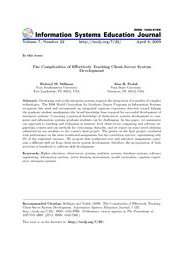Volume 7
Volume 7, Number 22 |
April 8, 2009 |
Abstract: Developing real-world enterprise systems requires the integration of a number of complex technologies. The 2006 Model Curriculum for Graduate Degree Programs in Information Systems recognizes this need and recommends an integrated capstone experience directed toward helping the graduate student amalgamate the broad knowledge base required for successful development of enterprise systems. Conveying a practical knowledge of client-server systems development to computer and information systems graduate students can be challenging. In this paper, we summarize our approach to teaching and evaluation in masters’ level client-server computing and software engineering courses and our methods for overcoming obstacles, and we report on some novel solutions submitted by our students to the course’s final project. The grades on the final project correlated with performance on the more traditional assignments but the correlation was low, representing only 5% of the explained variance. We propose that traditional text and narrative assignments represent a different skill set from client-server system development; therefore, the incorporation of both activities is beneficial to software skill development.
Keywords: Higher education, client-server systems, multitier systems, database systems, software engineering, information systems, active learning environment, model curriculum, capstone experience, enterprise systems
Download this issue: ISEDJ.7(22).Stillman.pdf (Adobe PDF, 10 pages, 618 K bytes)
Preview the contents: Stillman.j.txt (ASCII txt, 26 K bytes)
Recommended Citation: Stillman and Peslak (2009). The Complexities of Effectively Teaching Client-Server System Development. Information Systems Education Journal, 7 (22). http://isedj.org/7/22/. ISSN: 1545-679X. (A preliminary version appears in The Proceedings of ISECON 2008: §2712. ISSN: 1542-7382.)
